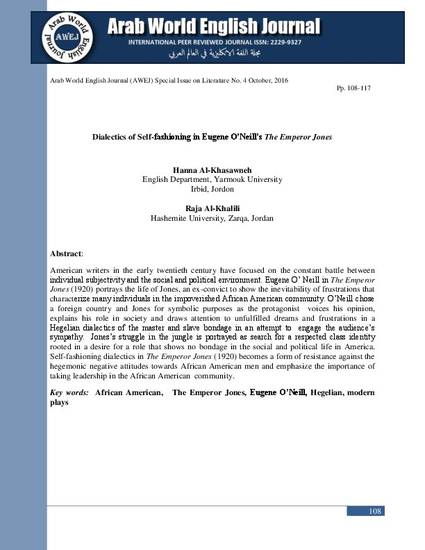
Article
Dialectics of Self-fashioning in Eugene O’Neill’s The Emperor Jones
Arab World English Journal
(2016)
Abstract
American writers in the early twentieth century have focused on the constant battle between individual subjectivity and the social and political environment. Eugene O’ Neill in The Emperor Jones (1920)portrays the life of Jones, an ex-convict to show the inevitability of frustrations that characterize many individuals in the impoverished African American community. O’Neill chose a foreign country and Jones for symbolic purposes as the protagonist voices his opinion, explains his role in society and draws attention to unfulfilled dreams and frustrations in a Hegelian dialectics of the master and slave bondage in an attempt to engage the audience’s sympathy. Jones’s struggle in the jungle is portrayed as search for a respected class identity rooted in a desire for a role that shows no bondage in the social and political life in America. Self-fashioning dialectics in The Emperor Jones (1920) becomes a form of resistance against the hegemonic negative attitudes towards African American men and emphasize the importance of taking leadership in the African American community.
Keywords
- African American,
- The Emperor Jones,
- Eugene O’Neill,
- Hegelian,
- modern plays
Disciplines
Publication Date
Fall October 15, 2016
Citation Information
Hanna Al-Khasawneh & Raja Al-Khalili. "Dialectics of Self-fashioning in Eugene O’Neill’s The Emperor Jones" Arab World English Journal Iss. 4 (2016) p. 108 - 117 ISSN: 2229-9327 Available at: http://works.bepress.com/arabworldenglishjournal-awej/316/